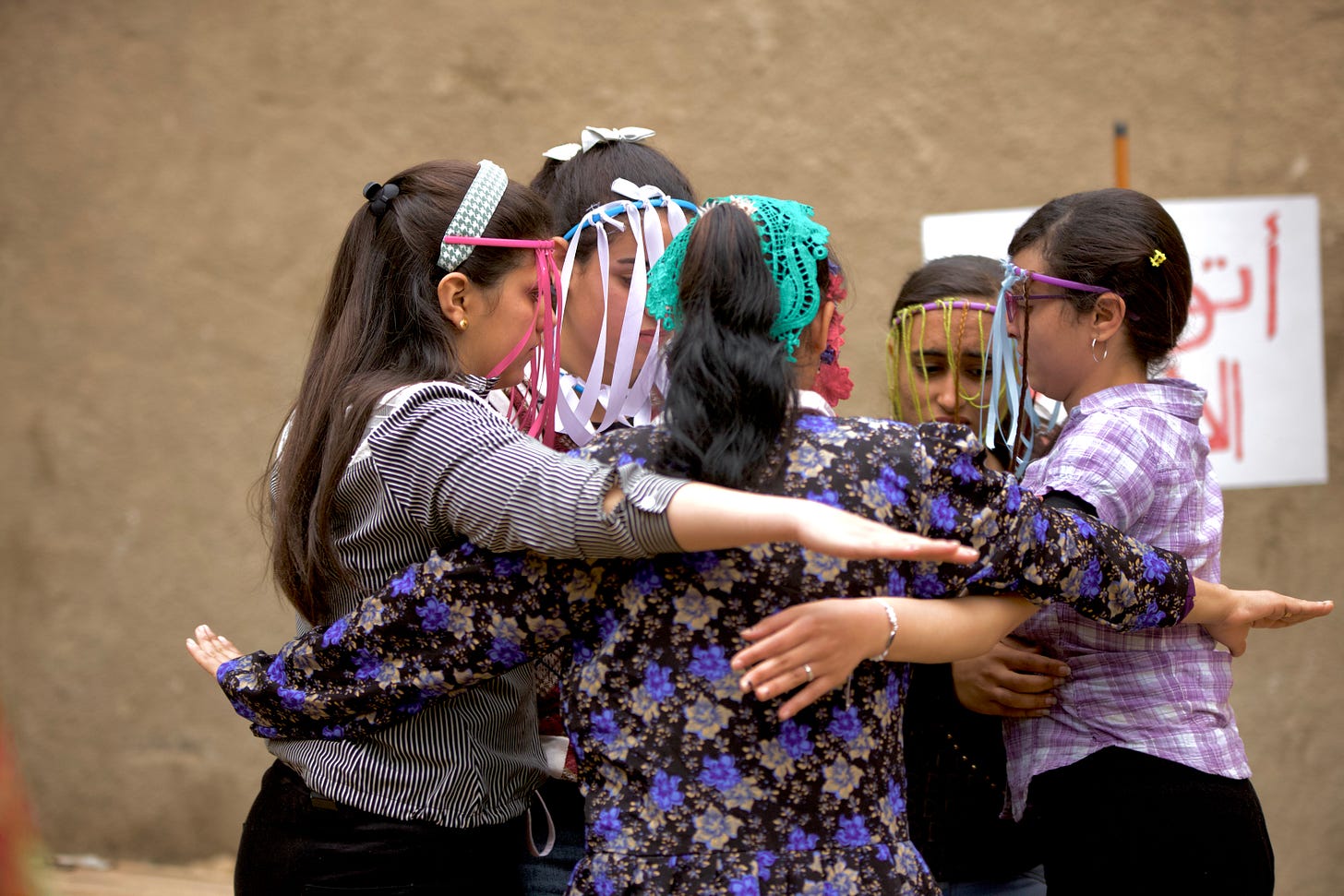Rural dreams to red carpet: the girls of Panorama Barsha shine at Cannes
Girls and young women transform their village streets into a stage, confronting societal norms and amplifying their voices through theater
On the east bank of the Nile, a little more than three hours drive from Cairo, lies the village of El Barsha. It is a place of agriculture in the southern end of Minya, the Egyptian governorate with the largest proportion of the country’s Coptic community.
Though they may not appear it at first, the narrow streets of this village are also a stage. Through performance, these alleys see truths that are normally kept in silence instead spoken aloud; injustices and inequalities are challenged; fears that haunt our thoughts are banished, and dreams of lives that could be are manifested.
Panorama Barsha are the remarkable theater troupe who make the streets of their village into this stage. The performers are girls and young women, using theater to explore and examine their world, the challenges they face, and their hopes and dreams.
The work is led by the incredible Youstina Samir, a woman who knows the power that theater and performance have to allow us to understand and play with our identities - particularly for marginalised groups.
In kind with girls across the world, the members of Panorama Barsha are weighed down by societal expectations, patriarchal norms that set limits on who they are and who they can be. As women, as young people, as members of a religious minority, living in a rural area, they find themselves at the intersections of complex layers of discrimination and inequality.
With theater, Youstina has given the girls a new vocabulary to talk about and challenge the various forms of oppression they face, and give voice to their dreams. The girls regularly take the stage in El Barsha to talk about the issues that are important to them - from early marriage, to the need to take action on climate change - through song, dance, drama and poetry.
From the modest surroundings of their rural community, last week the girls of Panorama Barsha took to a very different stage. Instead of performing in front of their peers, their neighbours, their families, the girls mingled with some of Hollywood’s biggest names, facing hundreds of paparazzi, standing on the red carpet.
For four years, filmmakers Nada Riyadh and Ayman El Amir have documented the girls of Panorama Barsha - their performances, their struggles, their lives. The film that they have created, The Brink of Dreams, was the sole film from Egypt - and the only documentary feature - to be selected to compete at his year at critics’ week during the Cannes Film Festival.
A personal and tender portrait of the freedoms the girls find in performance, the film does not shy away from the hostility they are sometimes met with from those in the community who would rather girls and young women simply stayed quiet. As co-director Ayman El Amir notes, there is so much more to the girls’ art than meets the eye, for the cast, “theater is a matter of survival”.
The girls of Panorama Barsha deserve their time in the spotlight, and the directors of The Brink of Dreams deserve their accolades. In particular, Youstina Samir should be celebrated for her work. At Karama, we are honored to support the work of Panorama Barsha and Youstina as key partners in the Wa’ed network for adolescent girls, which has tried to create a safe space for girls across Africa and the Arab region to join together in a safe space.
It is amazing to see the creativity and sensitivity that Youstina brings to her work, and the energy and insight that the girls of Panorama Barsha have brought to the Wa’ed network. They and their peers have shaped the form and priorities of Wa’ed, highlighting the issues they want to deal with, like promoting girls’ rights, and addressing problems like gender-based violence and the traditional gender roles that hold them back from achieving what they want in life.
Thanks to the incredible and pioneering support of the Tides Foundation and NoVo Foundation, the Wa’ed network has been able to grow to include adolescent girls from across the region.
Girls and young women are so often ignored and oppressed, but listening to the girls, allowing them the space to express themselves, has been as important and eye-opening for us activists as they have been liberating for the girls. They have such potential, they have such dreams, they want to build a better world for themselves, their sisters, their brothers, their families, their communities.
The incredible work that activists and leaders like Youstina Samir do has such value, and rarely do they have the chance to be in the spotlight as they were last week.
At times we might look down on the attention given to entertainment and the fascination with celebrity. Even when global stars have used events like Cannes to shine a light on Gaza, it seems distasteful to turn our attention away from a genocide to anything apparently so frivolous. But through art, we can share our pain and our joy, we can learn, we can hear and be heard - often more clearly than is possible by any other means.
Through Panorama Barsha, Youstina has provided an incredible resource and outlet for girls to express themselves, to learn and grow, and for their community to learn from them.
When they are on the streets in their small rural village, so often they are playing roles. But this time, during their moment on the red carpet, these girls are not performing at all, they truly are stars.







